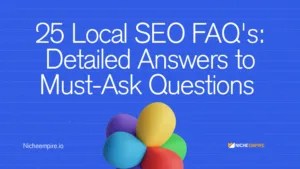According to the CDC, 25.5 million people visited the ER for unintentional injuries in 2021. That was about 8% of the US population of 322 Million people in 2021, showing the need for legal services for personal injury lawyers.
The question is how can they locate you and how they can trust you. Personal Injury Lawyer SEO is a powerful weapon that can address these questions.
As more people look to Google and other search engines for legal assistance and law firms, ranking high on search engines gives you an edge.
We are breaking down steps to help you stand out from over 48,000 personal injury lawyers and attorneys in the US.
Summary
- Why is SEO Important for Personal Injury Lawyers?
- An Understanding of Online Search for Personal Injury Law
- Complete SEO Strategy for Personal Injury Lawyers
- Tools for Personal Injury SEO
- Conclusion
- FAQs
Why is SEO Important for Personal Injury Lawyers?
There are several reasons why search engine optimization is essential for personal injury attorneys.
Personal Injury Field is Highly Saturated
Personal injury is very competitive, with so many firms seeking clients. Lawyers and firms with deep pockets for advertising end up reaching more potential clients.
With SEO, you and your firm can stand out even with a smaller digital marketing budget.
Attract High-Value Cases and Clients
People need to believe you are capable and can help them seek redress. The right SEO strategy can differentiate you, making you an authority and attracting clients.
Build Long Lasting Credibility
Your website content ranking high on search engines like Google makes you reliable and trustworthy to your potential clients.
An Understanding of Personal Injury Lawyer SEO
The foundation of SEO is built on the intention of online searchers and applies to SEO for personal injury.
Types of Search Intent and Examples for Personal Injury SEO
Informational
These searches are seeking knowledge or guidance for their problems or situations. A typical example could be“What to do right after a car accident.”
Navigational
They don’t need information; they want to locate a particular law firm or a lawyer. They could type a sentence like “N&E law firm“ on Google.
Transactional
People with transactional intent are at the point of deciding the law firm to use or injury lawyer to hire. “Hire a personal injury lawyer in Dallas.”
Commercial
These searches actively assess personal injury lawyers for hire. They will check different lawyers, their websites, and reviews to make an informed decision.
A commercial keyword can be “Personal Injury Lawyer in Kansas.”
Purpose of Search Intent – Tailor Content to Search Intent
The essence of understanding the search intent is to relate it to your potential clients. This will form the content you create for your website and even social media.
- Your web content must be relevant to people’s intentions when they search for your services.
- Search intents that match the concerns of your potential clients are key to a successful SEO campaign.
Check out our beginner’s guide to SEO for attorneys.
Complete SEO Strategy for Personal Injury Lawyers
You need these SEO tactics to achieve high rankings on search results.
1. Keyword Strategies for Personal Injury Lawyers
SEO begins with relevant keyword research, and you must get it right.
Use Long-Tail Keywords
It is usually difficult to rank high on search engines with broad terms or keywords like personal injury lawyer.
Instead, use keywords like “construction accident lawyer in New York.”
SEO tools like Niche Empire, Semrush, and Ahrefs are excellent for finding relevant keywords. Enter words or phrases your clients would use to find your services online.
Benefits of Long Tail Keywords
- Reduced Competition
Broad keywords are highly competitive because many established personal injury firms and attorneys have long ranked for them. It’s easier to rank for more specific keywords as there is less competition.
- Higher Conversion Rates
People searching these keywords are more likely at the point of deciding on firms and attorneys they want to hire.
- Better User Experience
The specificity of long-tail keywords helps you create targeted and more relevant content.
Get your keyword research right.
Voice Search Optimization
Voice search has become popular; you must factor it into your SEO strategy. Optimize your content for voice search by using a conversational tone to enhance user experience.
For example, people might say, “Is there an affordable injury lawyer near me? What do I do after falling at my workplace?” to Siri or Google Assistant. These questions will be different if they were typed.
Semantic SEO
Synonyms and related keywords enrich your topics and content. It makes your content more relevant to a broader audience. Also, it helps search engines better understand the content on your website.
For example, you can include trip and fall accidents, property owner negligence, and premises liability to the keyword “slip and fall attorney.”
Using related keywords can improve your rankings on search engine result pages (SERPS) and get more leads.
2. Content Strategies for Personal Injury Lawyers
Moving on to the content of your web pages, your website needs to contain various information.
High-Value Pages
Irrespective of your website layout, some of its pages can give your website higher value.
Case Result Pages: These can showcase your successful outcomes and experience and help build credibility.
Testimonials: Client testimonials show real-life cases of people and reinforce trust in potential clients.
Comprehensive Guides: These are detailed guides and FAQs that answer common concerns. For example, “What to Do After a Work Machinery Accident.”
They should answer questions that your clients would like to know. For example, “What to Bring Along to An Injury Consultation.”
Content Formats That Work
Use different content formats to get across to every category of your target audience.
Blogs
Quality blog posts provide detailed information on everything relating to personal injury. Your blog posts should answer the search intent and desires of people needing your services.
Include your keyword to make it more visible on search engines.
Videos
Videos are great for getting more engagement. Create videos that explain common questions your clients have. They are also suitable for showing your expertise and gaining trust.
Infographics
Break down complex legal information into visually appealing graphics for easy understanding.
Webinars
Hosting webinars to address your potential clients’ concerns helps you build relationships. They provide an opportunity to show your expertise.
Content Optimization
When you have crafted detailed content, you must optimize it for search engines, also known as on-page SEO.
More details on content optimization.
Keyword Placement
Add keywords naturally to the titles, subtitles, body of the text, video captions, and meta description. This helps search engines understand your web page and will direct you to those searching for it.
Image Optimization
Use clear, relevant images with descriptions to enhance search engine rankings.
Internal Linking
Link your content and pages within your site to one another.
For example, a “Who is Liable in A Boating Accident” blog can be linked to another blog or post on “First thing to do after a boat accident.”
It enhances your web user experience and shows your level of authority as a personal injury lawyer.
Learn more about SEO links.
3. Local SEO Tactics for Personal Injury Lawyers
Local SEO helps attract more clients within your state, city, or county. Here’s how to go about it.
Use Geo-Specific Keywords
Use keywords that are specific to locations to attract local clients. Keywords like “car accident attorney in Alabama,” “personal injury lawyer in West Orange,” and “Brooklyn slip and fall lawyer.”
More on Local SEO for lawyers.
Google My Business Listing and Optimization
List your services and legal firm on Google Business Profile. It boosts your visibility and credibility and can improve your search engine rankings.
- Regular Profile Updates: Ensure your profile is up-to-date with accurate information.
- Ask For Reviews: Ask satisfied clients to place their reviews on your Google Business Page.
- Respond to All Reviews: Respond promptly to positive and negative reviews; it shows that you value the feedback.
- Post Consistently: Keep your profile active by sharing content, updates, and testimonials.
Optimizing your Google Business profile improves your brand awareness and visibility online.
You will like our post on Google My Business SEO.
Create Local Content
Target potential clients around by creating content that centers on your locality.
- Local News and Events: Address community issues and events with your content.
- Showcase Local Successes: Highlight successful cases in your community and your contribution.
4. Technical SEO for Personal Injury Websites
While technical SEO might be a bit complex, it plays a crucial role in SEO. Here’s a brief and easy breakdown of it.
Core Website Vitals
They reveal your website performance, like loading time, providing ways to improve your web visitors’ experience.
It is important because Google and other search engines use website vitals as a ranking factor.
Structured Data Markup
Schema markup is a code that helps search engines understand your web content. It makes your key information more visible on search engine results.
Mark up your reviews, contact details, and FAQs to make them appear as featured snippets. These snippets are more attractive and can give your website a competitive edge.
Secure Websites
Ensure your site and sensitive data are secured with an SSL certificate. It builds trust and contributes to your ranking.
5. Build Website Authority Through Off-page SEO
Off-page SEO involves improving your website’s reputation by getting links from other websites. When other websites cite your content in theirs, you earn backlinks, and it influences your website authority,
How to Build Links for Your Website
You can build links for your website with the following
Legal Directories
Listing your website on legal directories can help you build your link profile. Do this on legal directories like Avvo, FindLaw, and Justia.
Guest Blogging
Writing for other websites (guest posts) is a good way to earn links to your website. Guest blogging shows your expertise and gives you access to a wider audience.
6. Metrics to Track SEO Performance
These key performance indexes monitor your SEO performance and marketing strategy.
Organic Traffic Growth
This is the number of people visiting your website without paid online marketing. It could be web visitors per day, week, month, quarter, or annually.
Conversion Rates
Conversion rates are the percentage of your web visitors that respond to your call to action. This could be to contact your firm or to book a consultation.
Keyword Rankings
This is ranking your main keywords on search engine results pages (SERPs) for your content.
Backlink Profile
It monitors the websites and content that are linked to your site. Analyze the quality, number, highlighted text (anchor text), and website reputations.
Related Post: SEO Metrics
Tools for Personal Injury SEO
Some tools can help you find relevant, less competitive keywords and monitor your rankings and backlinks.
Niche Empire
Niche Empire has a robust database and can identify keywords, opportunities for ranking, and backlink building.
Ahrefs
This tool can help you find keywords and search engine result Pages (SERP) analyses.
SEMrush
Semrush has several SEO features for keywords and other SEO analyses.
AnswerThePublic
AnswerThePublic is excellent for searching for keywords based on questions people ask online.
Google Analytics
This free tool tracks organic visitors to your website. Google Analytics monitors the pages and content they view and the duration of their visit.
Google Search Console
Google Search Console provides information on your website’s performance in Google. It reveals your high-performing keywords and pages and other website issues for free.
Conclusion
High rankings are essential for reaching many more people who are actively in need of your services.
As a result, SEO for personal injury lawyers is a more affordable and effective way to boost your online presence and reach your target audience.
Use these strategies to get your message to your audience. Which of them have you already implemented?
Frequently Asked Questions
Why is SEO Important for Personal Injury Law Firms?
SEO brings people to their website, improves brand visibility, and allows potential clients to find them for legal representation. Law firm SEO improves your firm’s ranking on search results.
Is SEO for Personal Injury Lawyer Effective?
Yes, SEO works for personal injury lawyers.
- The field is highly competitive, and SEO helps you stand out.
- Most people search for legal assistance online, and ranking high on search engines can attract new clients.
- It is also cost-effective, allowing you to compete with more prominent personal injury lawyers and firms.
How Can I Find Keywords for Personal Injury law
- Understand the intent of your potential clients.
- Find relevant keywords on Niche Empire and other SEO tools.
- Expand your broad keywords into long-tail keywords and other variations.
What Are the Key SEO Tactics for Personal Injury Lawyers?
- Target long-tail keywords with less competition.
- Optimize your website for local SEO with location-specific keywords and list on Google Business Page.
- Create valuable content that addresses your audience’s needs.
- Ensure your website speed is fast and mobile-friendly.



